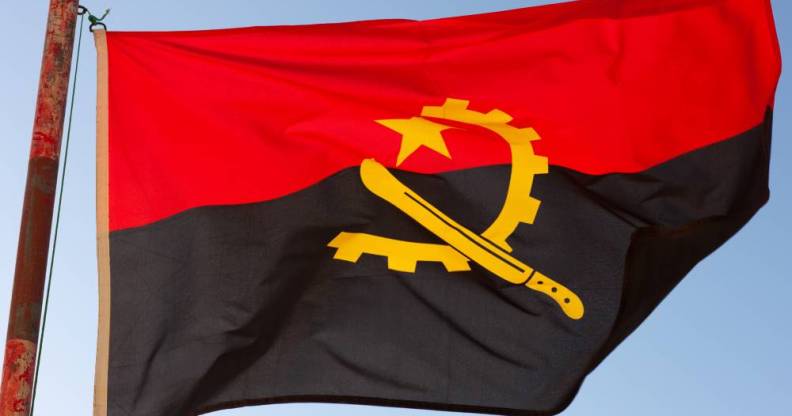Angola just ended its colonial-era gay sex ban

The Angolan flag. (Eric Lafforgue/Art In All Of Us/Corbis via Getty)
Angola has decriminalised homosexuality, lifting an archaic ban on same-sex relationships and introducing anti-discrimination protections.
A new law overturned a ban on same-sex relationships which was inherited from when the country was a Portuguese colony. The ban described same-sex relationships as a “vice against nature”.
Activist Jean-Luc Romero-Michel tweeted that the law was a “great step forward” in the fight against state-sponsored discrimination against the LGBT+ community in the Southern African nation.
He wrote: “The law decriminalising homosexuality adopted in Angola in 2019 took effect today.
“Discrimination on the basis of sexual orientation is now reprehensible and even punishable by prison.
“A great step forward for human rights which calls for others.”
La loi dépénalisant l’homosexualité adoptée en #Angola en 2019 a pris effet aujourd’hui.
👉 La discrimination sur la base de l’orientation sexuelle est désormais répréhensible et même passible de prison.
Une belle avancée pour les #DroitsHumains qui en appelle d'autres 🇦🇴🏳️🌈 pic.twitter.com/lplesllEl5
— Jean-Luc Romero-Michel (@JeanLucRomero) February 9, 2021
The new law also prohibits discrimination based on a person’s sexuality.
The changes were passed in January 2019 after 155 of Angola’s lawmakers passed a bill to update their penal code, but were not signed into law by the country’s president until November 2020.
Angola applauded for ending gay sex ban.
The new Angolan law has been broadly and warmly welcomed by human rights activists and the LGBT+ community worldwide. In Kenya, LGBT+ rights groups hoped the move would inspire change within their own nation.
We are excited & join #LGBTQ persons in #Angola to celebrate the decriminalization of homosexuality. This is surely a stride that continues to encourage & motivate us to advocate for the #Repeal162 here in Kenya! Aluta Continua!
👏🏿👏🏿✊🏿✊🏿#LoveIsHuman pic.twitter.com/mHdhBvrmZU— #Repeal162 because #LoveIsHuman (@NGLHRC) February 11, 2021
Congratulations to the #LGBTI community in #Angola #StandUp4HumanRights #RegisterESGM pic.twitter.com/IEGXmhnqFp— Eswatini Sexual & Gender Minorities (@EMinorities) February 11, 2021
Other African nations still punish people for same-sex relationships.
The changes in Angola came from the first rewriting of the country’s penal code since it gained independence in 1975. According to Human Rights Watch (HRW), the previous laws against same-sex relationships were rarely prosecuted but served as the basis for discrimination.
There are at least 69 countries that still have national laws criminalising same-sex relationships, according to HRW. At least nine countries criminalise forms of gender expression that target trans and gender-nonconforming people.
In Africa, these nations still outlaw same-sex relations: Morrocco, Algeria, Tunisia, Mauritania, Senegal, Gambia, Sierra Leone, Guinea, Liberia, Ghana, Togo, Nigeria, Cameroon, Namibia, Eswatini, Comoros, Zimbabwe, Zambia, Tanzania, Burundi, Kenya, Uganda, Somalia, Ethiopia, Sudan, Eritrea, Chad, Egypt, Libya, Mauritius.
South Sudan and Malawi both criminalise same-sex relationships and forms of gender expression including trans, non-binary and gender non-conforming people.
Laws outlawing homosexuality are colonial hangovers. When Botswana decriminalised gay sex in 2019, judge Michael Leburu declared “the anti-sodomy laws are a British import” developed “without the consultation of local peoples”.

